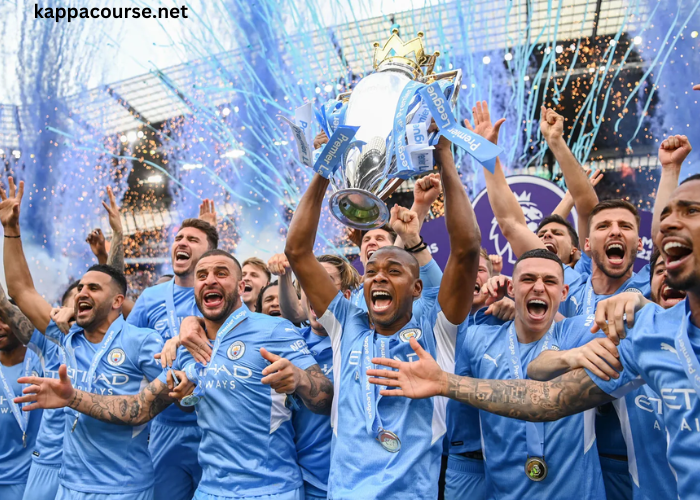Manchester City Football Club, commonly known as Manchester City or simply City, stands as a prominent entity in the world of football. With a rich history, significant achievements, and a growing global presence, the club has made its mark in both domestic and international competitions. This article delves into the club’s history, accomplishments, key figures, and its impact on the footballing world.
The Origins and Early Years
Manchester City Football Club was founded in 1880 as St. Mark’s, a church team in the Ardwick area of Manchester. The club underwent several name changes before becoming Manchester City in 1894. Early successes were modest, but the club steadily built a reputation in English football.
City’s early years were marked by fluctuating fortunes. They achieved some local success in the late 19th and early 20th centuries, including winning the FA Cup in 1904. However, the club faced challenges, including relegations and promotions, which shaped its development.
Rise to Prominence
The mid-20th century saw Manchester City rise to prominence in English football. The club enjoyed considerable success during the 1960s and 1970s, under the management of Joe Mercer and Malcolm Allison. They secured their first league title in 1968 and followed it up with an FA Cup win in 1969 and the European Cup Winners’ Cup in 1970. This period established City as a competitive force in English football.
Despite subsequent decades of struggle, including relegations and financial difficulties, Manchester City remained a significant presence in the sport. The club’s fortunes changed dramatically in the late 2000s with a series of transformative events.
The Abu Dhabi Takeover and Transformation
A pivotal moment in Manchester City’s modern history occurred in 2008 when the club was acquired by the Abu Dhabi United Group, led by Sheikh Mansour bin Zayed Al Nahyan. This takeover brought substantial financial investment, enabling the club to acquire high-profile players and invest in infrastructure.
The influx of funds marked the beginning of a new era for Manchester City. The club embarked on a major rebuilding project, with significant signings and improvements to the Etihad Stadium. The investment paid off as Manchester City began to assert dominance in English and European football.
Domestic Dominance
Manchester City’s transformation under Sheikh Mansour led to a period of unprecedented domestic success. The club’s achievements in the Premier League are a testament to its competitive prowess. Manchester City secured their first Premier League title in the 2011-2012 season, famously clinching the title with a last-minute goal from Sergio Agüero against Queens Park Rangers.
The club’s domestic success continued with multiple Premier League titles, FA Cups, and League Cups. Manchester City’s dominance in English football was characterized by a combination of tactical innovation, high-quality player acquisitions, and effective management.
European Aspirations
While Manchester City achieved significant success domestically, the club’s European aspirations remained a key focus. Despite strong performances in the UEFA Champions League, the club initially struggled to secure the prestigious trophy. However, their consistent presence in the latter stages of the competition demonstrated their growing stature in European football.
The pursuit of the UEFA Champions League title became a central goal for Manchester City. The club invested heavily in strengthening its squad, with the aim of achieving European glory. As of the 2022-2023 season, Manchester City made notable progress in the Champions League, culminating in their first win of the competition in the 2022-2023 season.
Key Figures and Management
The success of Manchester City is closely linked to several key figures who have shaped the club’s fortunes. Notable managers, such as Roberto Mancini, Manuel Pellegrini, and Pep Guardiola, have played crucial roles in the club’s evolution.
Roberto Mancini led City to their first Premier League title in 2012, marking the beginning of a new era of success. Manuel Pellegrini continued this momentum with domestic titles and a notable run in the Champions League. Pep Guardiola, one of the most acclaimed managers in football, has been instrumental in City’s recent successes, including multiple Premier League titles and the Champions League.
Key players such as Sergio Agüero, Kevin De Bruyne, and Raheem Sterling have also made significant contributions to the club’s achievements. Their performances on the pitch have been central to Manchester City’s success and its competitive edge in both domestic and European competitions.
The Etihad Stadium and Club Infrastructure
The Etihad Stadium, Manchester City’s home ground, is a symbol of the club’s modern era. Opened in 2003, the stadium has undergone several expansions and improvements to accommodate the club’s growing fan base and aspirations.
The investment in infrastructure extends beyond the stadium. Manchester City has developed state-of-the-art training facilities, including the City Football Academy, which serves as a hub for player development and youth academy operations. These facilities support the club’s commitment to nurturing talent and maintaining a competitive edge.
Community Engagement and Social Responsibility
Manchester City is not only known for its on-field successes but also for its community engagement and social responsibility initiatives. The club actively participates in various charitable activities and community programs, aiming to make a positive impact both locally and globally.
The Manchester City Foundation plays a crucial role in supporting community projects, promoting education, and encouraging healthy lifestyles. The club’s commitment to social responsibility reflects its broader role as a positive force in society, extending beyond football.
Future Prospects
Looking ahead, Manchester City’s future prospects are promising. The club’s strong financial position, continued investment in infrastructure, and focus on player development position it well for sustained success. The ambition to maintain dominance in domestic competitions and achieve further success in Europe remains a central goal.
As football evolves, Manchester City is likely to continue adapting and innovating. The club’s strategic vision, combined with its history of success, suggests that it will remain a major player in global football. Fans and analysts will be watching closely to see how Manchester City navigates the challenges and opportunities that lie ahead.
Conclusion
Manchester City Football Club has undergone a remarkable transformation from its early years to becoming a dominant force in modern football. The club’s rich history, domestic successes, and growing European presence illustrate its evolution and impact on the sport. Key figures, significant investments, and a commitment to community engagement have contributed to Manchester City’s prominence in football.
As the club continues to pursue excellence both on and off the pitch, its legacy as a leading football institution is firmly established. The journey from its origins to its current status reflects Manchester City’s resilience, ambition, and dedication to the beautiful game. As the club looks to the future, its continued success and influence in football will undoubtedly shape the sport for years to come.







